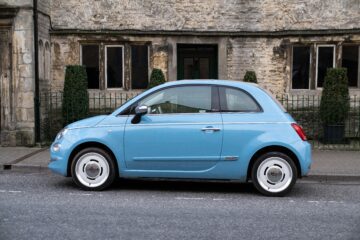PCP agreements are designed to make car ownership more accessible and affordable. The key feature of PCP is that you are essentially paying off the vehicle’s depreciation during the contract period, rather than its entire value. This means lower monthly payments compared to other financing options.
According to the Finance & Leasing Association, PCP agreements accounted for 82% of new car finance deals in the UK in 2020.
PCP agreements offer flexibility at the end of the contract, allowing you to either:
- Pay the balloon payment and own the car outright
- Return the car to the dealer and walk away (subject to mileage and condition restrictions)
- Trade the car in for a new vehicle and start a new PCP agreement
PCP agreements provide an attractive option for those looking to drive a new or used car with lower monthly payments and increased flexibility at the end of the contract period. With their popularity on the rise, it’s essential to understand how these agreements work and whether they suit your individual needs and financial situation.
Go to
Understanding PCP Agreements and Your Rights
Personal Contract Purchase (PCP) agreements are a popular and flexible car finance option that allows you to drive a new or used vehicle for a fixed period with lower monthly payments compared to traditional car loans. At the end of the agreement, you have the choice to buy the car, return it, or trade it in for a new one.
Key Takeaways:
- PCP agreements involve a deposit, monthly payments, and an optional balloon payment at the end of the contract
- Pros include lower monthly payments and flexibility, while cons include mileage restrictions and potential additional costs
- Compare PCP to other finance options like HP and PCH to determine the best fit for your needs
- If you believe you have been mis-sold a PCP agreement, you may be eligible for a claim through companies like PCP Claims
- Always read the fine print, ask questions, and seek expert advice to make an informed decision when considering a PCP agreement
How Does a PCP Agreement Work?
A PCP agreement consists of three main components: a deposit, monthly payments, and an optional balloon payment at the end of the contract.
The deposit is usually around 10% of the car’s value and is paid upfront. This initial payment helps to lower the monthly payments throughout the contract period.
Monthly payments are calculated based on the car’s projected depreciation during the contract period, plus interest. The depreciation is the difference between the car’s initial value and its expected value at the end of the contract, known as the Guaranteed Minimum Future Value (GMFV).
At the end of the PCP agreement, you have three options:
- Pay the balloon payment (GMFV) and own the car outright
- Return the car to the dealer and walk away (subject to mileage and condition restrictions)
- Trade the car in for a new vehicle and start a new PCP agreement
If you decide to return the car, you must ensure that it is in good condition and has not exceeded the agreed mileage limit, as specified in the contract. Exceeding the mileage limit or returning the car in poor condition may result in additional charges.
PCP agreements provide a clear and structured approach to car financing, with fixed monthly payments and a choice of options at the end of the contract. By understanding the key components of a PCP agreement, you can make an informed decision about whether this financing method is right for you.
How to Choose the Right PCP Scheme for You
Selecting the right PCP scheme involves considering factors such as the contract length, deposit amount, annual mileage, and interest rate.
When choosing a PCP agreement, it’s essential to find a balance between affordable monthly payments and a contract that suits your lifestyle. Here are the key factors to consider:
| Factor | Description |
| Contract Length | Typically 2-4 years. Longer contracts mean lower monthly payments but more interest paid overall. |
| Deposit Amount | Usually around 10% of the car’s value. Higher deposits result in lower monthly payments. |
| Annual Mileage | Agree on a realistic mileage limit to avoid excess charges. Lower mileage limits generally mean lower monthly payments. |
| Interest Rate | Shop around for competitive APR offers. Lower interest rates can significantly reduce the overall cost of the agreement. |
It’s crucial to be honest with yourself about your needs and preferences when selecting a PCP scheme. For example, if you regularly drive long distances, opting for a lower annual mileage limit to reduce monthly payments may not be the best choice, as you could end up paying significant excess mileage charges at the end of the contract.
Similarly, while a longer contract may seem attractive due to lower monthly payments, it’s important to consider whether you want to commit to the same car for an extended period. If you enjoy regularly updating your vehicle, a shorter contract may be more suitable.
When comparing PCP offers from different providers, always pay attention to the total amount payable, which includes the deposit, monthly payments, and balloon payment (if you plan to purchase the car at the end of the contract). This will give you a clearer picture of the overall cost of the agreement.
Choosing the right PCP scheme requires careful consideration of your personal circumstances, lifestyle, and budget. By weighing up the various factors and comparing offers from multiple providers, you can find a PCP agreement that meets your needs and helps you get behind the wheel of your desired vehicle.
What Happens at the End of a PCP Agreement?
At the end of a PCP agreement, you have three options: pay the balloon payment to own the car, return the car to the dealer, or trade the car in for a new vehicle and start a new PCP agreement.
The end of a PCP agreement is a crucial point in the car financing process, as it determines your next steps. Let’s take a closer look at each option:
| Option | Description | Pros | Cons |
| Pay the Balloon Payment | Pay the pre-agreed GMFV to own the car outright. | You become the owner of the car. | The balloon payment can be substantial, requiring a lump sum. |
| Return the Car | Hand the car back to the dealer and walk away (subject to mileage and condition restrictions). | No further financial obligations if the car is in good condition and within the mileage limit. | You won’t have a car after returning it and will need to find alternative transportation. |
| Trade-in for a New Car | Use any equity (if the car is worth more than the GMFV) as a deposit for a new PCP agreement. | You can upgrade to a newer car without having to save up for a deposit. | You’ll be entering into a new financial commitment, and the new agreement may have different terms. |
It’s important to plan ahead and consider which option best suits your needs and financial situation. If you want to keep the car and can afford the balloon payment, ensuring you have the necessary funds in place is crucial.
If you decide to return the car, make sure you’ve adhered to the terms of the agreement, such as staying within the mileage limit and keeping the car in good condition. Failing to do so may result in additional charges.
Trading in your car for a new one can be an attractive option if you want to continue driving a new vehicle without the hassle of selling your old car privately. However, keep in mind that you’ll be entering into a new financial commitment, and the terms of the new PCP agreement may differ from your current one.
What are the Pros and Cons of PCP Agreements?
PCP agreements offer several advantages, such as lower monthly payments and flexibility, but they also have some drawbacks, including mileage restrictions and the potential for additional costs.
| Pros | Cons |
| Lower monthly payments compared to traditional car loans | Mileage restrictions and potential excess mileage charges |
| Flexibility at the end of the contract (buy, return, or trade-in) | Additional costs for damage or excessive wear and tear |
| Opportunity to drive a new car every few years | No ownership of the vehicle until the balloon payment is made |
| Potentially lower deposit requirements compared to other finance options | Higher overall cost compared to purchasing a car outright |
One of the main advantages of PCP agreements is the lower monthly payments, which can make driving a newer or more expensive car more accessible. The flexibility at the end of the contract is also appealing, as it allows you to choose the option that best suits your needs.
However, PCP agreements come with mileage restrictions, and exceeding the agreed limit can result in significant excess mileage charges. Additionally, any damage or excessive wear and tear to the vehicle may lead to additional costs when returning the car.
It’s essential to carefully weigh the pros and cons of PCP agreements before committing to one. While they can be an attractive option for many car buyers, they may not be the best choice for everyone.
What Do You Need to Qualify for a PCP Agreement?
To qualify for a PCP agreement, you typically need to meet certain criteria, such as having a good credit score, being over a certain age, and having a stable income.
When applying for a PCP agreement, you’ll usually need to provide the following:
- Proof of identity (e.g., driver’s license or passport)
- Proof of address (e.g., utility bill or bank statement)
- Evidence of income (e.g., payslips or bank statements)
- Details of your employment history
- Information about your credit history
Lenders will assess your application based on these factors to determine your eligibility and the terms of your PCP agreement. A good credit score is important, as it demonstrates to lenders that you have a history of managing credit responsibly and are likely to make your payments on time.
Being over a certain age (usually 18 or 21) and having a stable income are also key requirements, as they indicate that you are likely to be able to afford the monthly payments throughout the contract period.
It’s important to be honest and accurate when providing information for your PCP application. Lenders may perform credit checks and verify the details you’ve provided, and any discrepancies could lead to your application being rejected.
If you’re unsure about your eligibility for a PCP agreement, it’s a good idea to check your credit score and speak to a financial advisor or the dealer’s finance team for guidance. They can help you understand your options and find a finance plan that suits your circumstances.
How Does PCP Compare to Other Car Finance Options?
PCP agreements differ from other car finance options, such as Hire Purchase (HP) and Personal Contract Hire (PCH), in terms of ownership, monthly payments, and flexibility.
When comparing PCP to other car finance options, consider the following:
- Ownership: With PCP, you don’t own the car until you make the balloon payment at the end of the contract. In contrast, HP agreements involve paying off the full value of the car over the contract period, meaning you own the vehicle once all payments are made.
- Monthly Payments: PCP agreements typically have lower monthly payments compared to HP, as you are only paying off the depreciation of the car rather than its full value. PCH (leasing) agreements may have even lower monthly payments, but you never have the option to own the car.
- Flexibility: PCP offers more flexibility at the end of the contract, allowing you to choose between buying the car, returning it, or trading it in for a new one. HP agreements are less flexible, as you are committed to purchasing the car from the outset. PCH agreements are also less flexible, as you must return the car at the end of the contract.
Ultimately, the best car finance option for you will depend on your personal preferences and financial situation. If you want the flexibility to change cars regularly and don’t mind not owning the vehicle outright, PCP could be a good choice. If you prioritize ownership and are willing to commit to higher monthly payments, HP might be more suitable. If you simply want to drive a new car for a fixed period without the option to buy, PCH (leasing) could be the way to go.
It’s essential to carefully consider your options and read the terms and conditions of any finance agreement before signing. Don’t be afraid to ask questions and seek advice from financial experts to ensure you’re making an informed decision.
Is a PCP Agreement Right for You?
PCP agreements have revolutionized the car finance industry, offering a flexible and affordable way for many people to drive their dream cars. However, it’s crucial to approach these agreements with a clear understanding of their terms, benefits, and potential drawbacks.
By carefully considering factors such as your budget, driving habits, and long-term goals, you can determine whether a PCP agreement is the right choice for your unique circumstances. It’s essential to compare different finance options, read the fine print, and ask questions to ensure you’re making an informed decision.
If you have previously entered into a PCP agreement, it’s worth noting that you may be eligible for a claim. Some finance providers have been known to misrepresent the terms of PCP agreements or fail to properly explain the risks and costs involved. If you believe you have been mis-sold a PCP agreement, companies like PCP Claims can help you assess your eligibility and guide you through the claims process.
Ultimately, the key to success with any car finance agreement is to be proactive, informed, and realistic about your needs and capabilities. By taking the time to understand your options and making a well-informed decision, you can enjoy the benefits of driving your desired vehicle without putting your financial well-being at risk.
Frequently Asked Questions
-
What happens if I exceed the agreed mileage limit on my PCP agreement?
If you exceed the mileage limit agreed upon in your PCP contract, you will likely be charged an excess mileage fee for every additional mile driven. These fees can add up quickly, so it’s important to estimate your mileage accurately at the start of the agreement.
-
Can I modify my car during a PCP agreement?
It’s generally not recommended to modify your car during a PCP agreement, as any changes could affect the vehicle’s value and lead to additional charges when you return the car. If you want to make modifications, it’s best to discuss this with your finance provider first.
-
What should I do if I can’t afford my PCP payments?
If you find yourself struggling to make your PCP payments, contact your finance provider as soon as possible. They may be able to offer you alternative payment arrangements or advise you on your options. Ignoring the problem could lead to more serious consequences, such as legal action or repossession of the vehicle.
-
Can I sell my car during a PCP agreement?
Selling your car during a PCP agreement is possible, but it’s not as straightforward as selling a car you own outright. You’ll need to contact your finance provider and pay off the remaining balance on your contract, which may include early termination fees. It’s essential to carefully consider the costs involved before deciding to sell.
-
Are there any additional costs to consider when entering a PCP agreement?
In addition to your deposit and monthly payments, there may be other costs to consider when entering a PCP agreement. These can include administration fees, servicing and maintenance costs, and insurance premiums. Make sure you factor these into your budget when deciding whether a PCP agreement is affordable for you.
Related Articles

Essential Questions to Ask Before Signing a PCP Agreement
A Personal Contract Purchase (PCP) agreement is a significant decision that requires thorough understanding and careful consideration. This blog post explores the essential questions you should ask.
Read More
Financial Ombudsman & PCP Claims
The Financial Ombudsman Service (FOS) plays a crucial role in resolving PCP Claim disputes between consumers and financial service providers, including those related to PCP car finance mis-selling.
Read More
What is a PCP Agreement?
A PCP (Personal Contract Purchase) agreement is a type of car finance that allows you to drive a new or used vehicle for a fixed period, typically 2-4 years, with lower monthly payments compared to traditional car loans.
Read More
What is a PCP Claim?
A PCP (Personal Contract Purchase) claim involves seeking compensation for being mis-sold a PCP car finance agreement. Typically, these claims arise when consumers were not fully informed about the terms and conditions of their PCP contract, leading to unexpected financial burdens.
Read More


